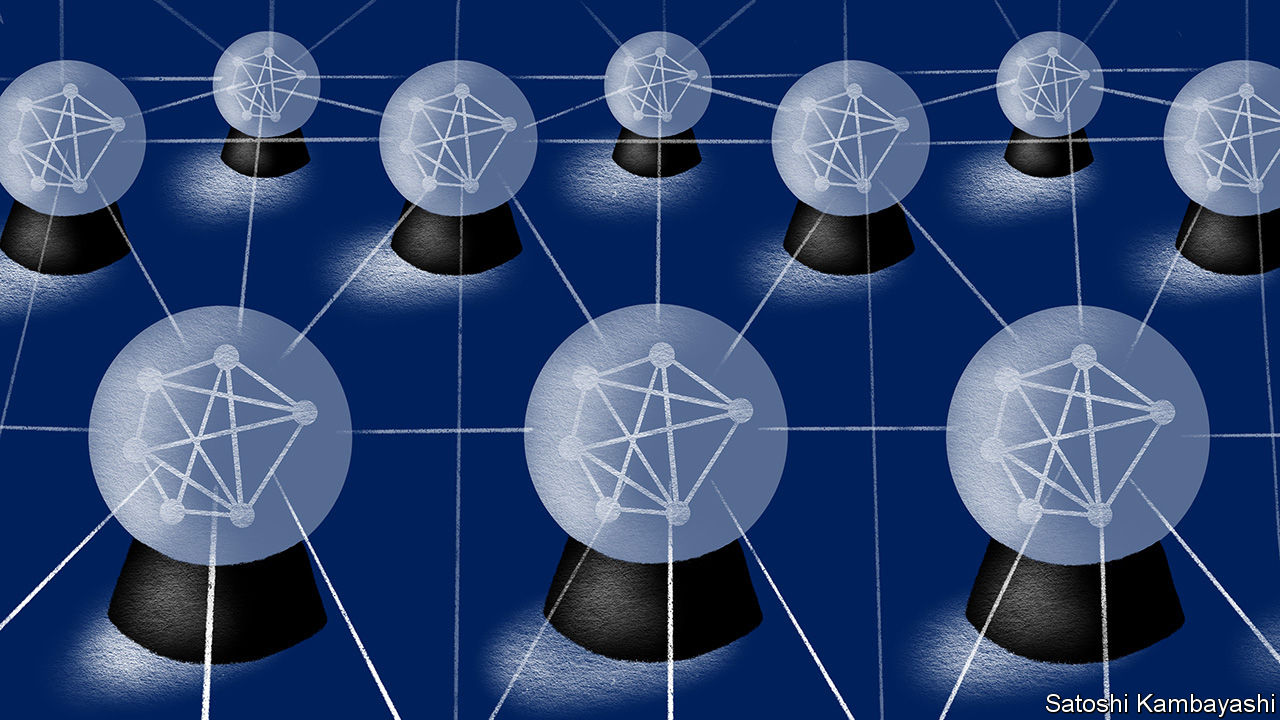Putting crowdsourcing and crypto-currencies behind an old idea.

WILL a Democrat win America’s next presidential election? Will Tesla file for bankruptcy by the end of 2019? Punters now have a new option for such bets: Augur, an online prediction market. Whether it takes off will be a gauge of the viability not only of such markets but of decentralised applications built on blockchains, the databases underlying crypto-currencies.
Augur is not the first online service that allows people to buy and sell predictions like shares. Since 1988 it has been possible to bet on American elections via Iowa Electronic Markets (IEM), run by the University of Iowa. PredictIt, a site based in New Zealand but with a largely American audience, and Betfair Exchange, a British service, also let users bet on political events. Some firms run such markets internally, for instance to predict demand for a product. All have the same goal: to gain insights into the future by giving those who hold useful information an incentive to reveal it.
But legal barriers have long hampered such attempts at crowdsourcing. In America many prediction markets are considered a form of illegal gambling, or akin to trading in commodities futures that requires a licence. Regulators have allowed such services to operate if they are structured as non-profit “research” initiatives and limit bet sizes and numbers of traders, as IEM and PredictIt do. But because of the legal risk, private investors are reluctant to finance prediction markets. Intrade, an Irish site, shut in 2013, partly because the Commodity Futures Trading Commission forced it to stop serving Americans.
Augur’s decentralised design should allow it to sidestep regulatory difficulties. In 2015 the Forecast Foundation, a non-profit group of developers, raised $5.5m by issuing a crypto-currency, REP, in a form of crowdfunding now known as an initial coin offering. Rather than living on a few servers, as Intrade did, Augur is a “protocol”, or set of technical rules, based on the Ethereum blockchain, that allows punters to set up their own prediction market. This will make betting cheaper, says Joseph Krug, one of Augur’s developers, and shift legal responsibility to bettors.
Yet decentralisation creates a new problem: who will decide the outcome of a bet? For Intrade, the firm itself declared the winner. For Augur, any holder of REP can become a “reporter”, in charge of checking facts on the ground for a fee. So that they are kept honest, reporters must stake some REP, which is forfeit if other reporters overturn a decision. Reporters can close a market they deem illegal or unethical. If they err, whether towards caution or tolerance, they can lose their REP deposit.
Markets have been created on the deaths of famous people. That has raised fears about the rise of “assassination markets” that incite people to commit murder for financial gain (none has been shut down yet since there have been no trades). A more immediate problem for Augur is getting people to use it. Predictions.Global, a website that tracks activity on Augur, lists nearly 1,000 markets with almost $1.5m at stake. Yet most are bets on the value of crypto-currencies. Worse, according to DappRadar, another website, the number of daily users has fallen from a peak of 265 in early July, straight after Augur’s launch, to 37 on August 8th.
Mr Krug says he is unconcerned. Augur is clunky and slow for users: downloading its software and the Ethereum blockchain can take hours. Now that they know the system works, he and his developers plan to make it more user-friendly. But success is not in their hands alone: Ethereum has run out of capacity and needs major upgrades.
Even if Augur is not a wild success, it is a “worthwhile exploration” of the viability of decentralised services, says Kevin Werbach, the author of “The Blockchain and the New Architecture of Trust”, a forthcoming book. Learning needs a lot of doing in the complex world of blockchains.
No comments:
Post a Comment
Note: Only a member of this blog may post a comment.